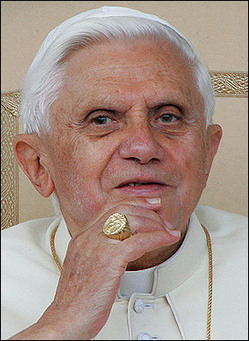When the Lord of the world comes and undertakes the slave’s task of foot-washing – which is an illustration of the way he washes our feet all through our lives – we have a totally different picture. God doesn’t want to trample on us but kneels down before us so as to exalt us. The mystery of the greatness of God is seen precisely in the fact that he can be small… Only when power is changed from the inside, and we accept Jesus and his way of life, whose whole self is there in the action of foot-washing, only then can the world be healed and the people be able to live at peace with one another. Pope Benedict XVI
Category: Pope Benedict XVI
The real agenda of Pope Benedict
Often we hear assertions by the media (and others) that they know what a person is thinking, or better, what he’ll do next and why. This is certainly true when talking about the pope: Vatican watchers (speculators?) think they have the pope pinpointed. Much of what is said in the media is a string of partial understandings: one would hope that we could just say we are making a prediction so when it doesn’t materialize we don’t run away with our heads hung low. Of course human nature seems to want to be right all the time to garner power, fame and even money. Intrigue is rather boring 99% of the time. That said, there are a few people who modestly have an understanding of Benedict XVI which we ought to note.
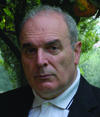 The longtime friend and collaborator of Msgr. Luigi Giussani, Msgr. Massimo Camisasca, also the founder of the Priestly Fraternity Missionaries of Saint Charles Borromeo, wrote an OP-Ed piece, “The Method Of Benedict XVI
The longtime friend and collaborator of Msgr. Luigi Giussani, Msgr. Massimo Camisasca, also the founder of the Priestly Fraternity Missionaries of Saint Charles Borromeo, wrote an OP-Ed piece, “The Method Of Benedict XVI
” for the online daily Il Sussidiario.net where he outlines a few important things in understanding Pope Benedict. Msgr. Camisasca is providing neither a comprehensive nor exhaustive look into Benedict’s life and work but is noting the evident things that many seem to miss. Consider the following themes:
 1. there’s preference for a person’s interior change; the Pope relies on theological premise of conversatio morum (conversion of life/attitude) wrought by the Holy Spirit: nothing is impossible with God;
1. there’s preference for a person’s interior change; the Pope relies on theological premise of conversatio morum (conversion of life/attitude) wrought by the Holy Spirit: nothing is impossible with God;
2. Catholic life necessarily entails a focus on the Church’s Liturgy which is rich in tradition because it is our first theology, that is, all else is derivative from the Liturgy: “…manifestation of God’s absolute prior initiative in human life, his grace, his mercy, and at the same time his ability to intervene in history, to give shape to existence, to accompany, visibly and invisibly, the paths of the cosmos toward their recapitulation” (above cited article); among other things read the Pope’s homilies because there’s an theological/spiritual itinerary that we need to be aware of but it’s found in this medium;
3. consider the initiatives found in the Years of Saint Paul and Saint John Vianney; what is more is more important than evangelization and priesthood? I would also add the work of the Synods of Bishops on the Word of God and the forthcoming one on Africa;
4. go east: think of Christian life in China which by all accounts has not been a raging success.
Aside from the normal cliches of recognizing that some call Pope Benedict the “new Leo the Great” or the “new Augustine” Msgr. Camisasca rightly focuses our attention on some rather important areas of concern for Benedict which also should concern us if we want to follow his lead to Christ. Instead of focusing on Benedict perhaps we focus on Christ through the lens of Benedict.
Greed takes the cake
At the Pope’s weekly audience he addressed the role of greed as the basis of our current economic problems viz. the life of an 8th century monk. Read the article published at Asia News.
Happy 4th anniversary Pope Benedict!
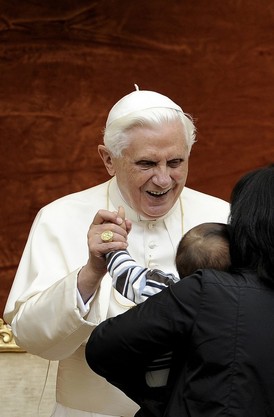 Lord, source of eternal life and truth, give to Your shepherd, Pope Benedict, a spirit of courage and right judgment, a spirit of knowledge and love.
Lord, source of eternal life and truth, give to Your shepherd, Pope Benedict, a spirit of courage and right judgment, a spirit of knowledge and love.
By governing with fidelity those entrusted to his care may he, as successor to the apostle Peter and vicar of Christ, build Your Church into a sacrament of unity, love, and peace for all the world.
We ask this through our Lord Jesus Christ, Your Son, Who lives and reigns with You and the Holy Spirit, one God, forever and ever. Amen.
May God grant Pope Benedict many years!
Birthday blessings!
Urbi et Orbi of Pope Benedict XVI, 2009
Dear Brothers and Sisters in Rome and throughout the world,
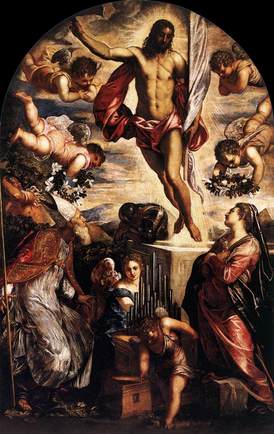 From the depths of my heart, I wish all of you a blessed Easter. To quote Saint Augustine, “Resurrectio Domini, spes nostra – the resurrection of the Lord is our hope” (Sermon 261:1). With these words, the great Bishop explained to the faithful that Jesus rose again so that we, though destined to die, should not despair, worrying that with death life is completely finished; Christ is risen to give us hope (cf. ibid.).
From the depths of my heart, I wish all of you a blessed Easter. To quote Saint Augustine, “Resurrectio Domini, spes nostra – the resurrection of the Lord is our hope” (Sermon 261:1). With these words, the great Bishop explained to the faithful that Jesus rose again so that we, though destined to die, should not despair, worrying that with death life is completely finished; Christ is risen to give us hope (cf. ibid.).
Indeed, one of the questions that most preoccupies men and women is this: what is there after death? To this mystery today’s solemnity allows us to respond that death does not have the last word, because Life will be victorious at the end. This certainty of ours is based not on simple human reasoning, but on a historical fact of faith: Jesus Christ, crucified and buried, is risen with his glorified body. Jesus is risen so that we too, believing in him, may have eternal life. This proclamation is at the heart of the Gospel message. As Saint Paul vigorously declares: “If Christ has not been raised, our preaching is in vain and your faith is in vain.” He goes on to say: “If for this life only we have hoped in Christ, we are of all men most to be pitied” (1 Cor 15:14,19). Ever since the dawn of Easter a new Spring of hope has filled the world; from that day forward our resurrection has begun, because Easter does not simply signal a moment in history, but the beginning of a new condition: Jesus is risen not because his memory remains alive in the hearts of his disciples, but because he himself lives in us, and in him we can already savour the joy of eternal life.
 The resurrection, then, is not a theory, but a historical reality revealed by the man Jesus Christ by means of his “Passover”, his “passage”, that has opened a “new way” between heaven and earth (cf. Heb 10:20). It is neither a myth nor a dream, it is not a vision or a utopia, it is not a fairy tale, but it is a singular and unrepeatable event: Jesus of Nazareth, son of Mary, who at dusk on Friday was taken down from the Cross and buried, has victoriously left the tomb. In fact, at dawn on the first day after the Sabbath, Peter and John found the tomb empty. Mary Magdalene and the other women encountered the risen Jesus. On the way to Emmaus the two disciples recognized him at the breaking of the bread. The Risen One appeared to the Apostles that evening in the Upper Room and then to many other disciples in Galilee.
The resurrection, then, is not a theory, but a historical reality revealed by the man Jesus Christ by means of his “Passover”, his “passage”, that has opened a “new way” between heaven and earth (cf. Heb 10:20). It is neither a myth nor a dream, it is not a vision or a utopia, it is not a fairy tale, but it is a singular and unrepeatable event: Jesus of Nazareth, son of Mary, who at dusk on Friday was taken down from the Cross and buried, has victoriously left the tomb. In fact, at dawn on the first day after the Sabbath, Peter and John found the tomb empty. Mary Magdalene and the other women encountered the risen Jesus. On the way to Emmaus the two disciples recognized him at the breaking of the bread. The Risen One appeared to the Apostles that evening in the Upper Room and then to many other disciples in Galilee.
The proclamation of the Lord’s Resurrection lightens up the dark regions of the world in which we live. I am referring particularly to materialism and nihilism, to a vision of the world that is unable to move beyond what is scientifically verifiable, and retreats cheerlessly into a sense of emptiness which is thought to be the definitive destiny of human life. It is a fact that if Christ had not risen, the “emptiness” would be set to prevail. If we take away Christ and his resurrection, there is no escape for man, and every one of his hopes remains an illusion. Yet today is the day when the proclamation of the Lord’s resurrection vigorously bursts forth, and it is the answer to the recurring question of the sceptics, that we also find in the book of Ecclesiastes: “Is there a thing of which it is said, ‘See, this is new’?” (Ec 1:10). We answer, yes: on Easter morning, everything was renewed. “Mors et vita, duello conflixere mirando: dux vitae mortuus, regnat vivus – Death and life have come face to face in a tremendous duel: the Lord of life was dead, but now he lives triumphant.” This is what is new! A newness that changes the lives of those who accept it, as in the case of the saints. This, for example, is what happened to Saint Paul.
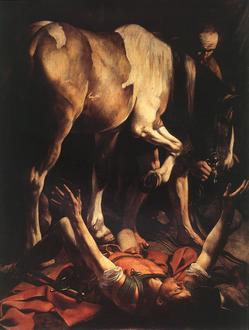 Many times, in the context of the Pauline year, we have had occasion to meditate on the experience of the great Apostle. Saul of Tarsus, the relentless persecutor of Christians, encountered the risen Christ on the road to Damascus, and was “conquered” by him. The rest we know. In Paul there occurred what he would later write about to the Christians of Corinth: “If anyone is in Christ, he is a new creation; the old has passed away, behold, the new has come” (2 Cor 5:17). Let us look at this great evangelizer, who with bold enthusiasm and apostolic zeal brought the Gospel to many different peoples in the world of that time. Let his teaching and example inspire us to go in search of the Lord Jesus. Let them encourage us to trust him, because that sense of emptiness, which tends to intoxicate humanity, has been overcome by the light and the hope that emanate from the resurrection. The words of the Psalm have truly been fulfilled: “Darkness is not darkness for you, and the night is as clear as the day” (Ps 139 [138]:12). It is no longer emptiness that envelops all things, but the loving presence of God. The very reign of death has been set free, because the Word of life has even reached the “underworld”, carried by the breath of the Spirit (v. 8).
Many times, in the context of the Pauline year, we have had occasion to meditate on the experience of the great Apostle. Saul of Tarsus, the relentless persecutor of Christians, encountered the risen Christ on the road to Damascus, and was “conquered” by him. The rest we know. In Paul there occurred what he would later write about to the Christians of Corinth: “If anyone is in Christ, he is a new creation; the old has passed away, behold, the new has come” (2 Cor 5:17). Let us look at this great evangelizer, who with bold enthusiasm and apostolic zeal brought the Gospel to many different peoples in the world of that time. Let his teaching and example inspire us to go in search of the Lord Jesus. Let them encourage us to trust him, because that sense of emptiness, which tends to intoxicate humanity, has been overcome by the light and the hope that emanate from the resurrection. The words of the Psalm have truly been fulfilled: “Darkness is not darkness for you, and the night is as clear as the day” (Ps 139 [138]:12). It is no longer emptiness that envelops all things, but the loving presence of God. The very reign of death has been set free, because the Word of life has even reached the “underworld”, carried by the breath of the Spirit (v. 8).
If it is true that death no longer has power over man and over the world, there still remain very many, in fact too many signs of its former dominion. Even if through Easter, Christ has destroyed the root of evil, he still wants the assistance of men and women in every time and place who help him to affirm his victory using his own weapons: the weapons of justice and truth, mercy, forgiveness and love. This is the message which, during my recent Apostolic Visit to Cameroon and Angola, I wanted to convey to the entire African continent, where I was welcomed with such great enthusiasm and readiness to listen. Africa suffers disproportionately from the cruel and unending conflicts, often forgotten, that are causing so much bloodshed and destruction in several of her nations, and from the growing number of her sons and daughters who fall prey to hunger, poverty and disease. I shall repeat the same message emphatically in the Holy Land, to which I shall have the joy of travelling in a few weeks from now. Reconciliation – difficult, but indispensable – is a precondition for a future of overall security and peaceful coexistence, and it can only be achieved through renewed, persevering and sincere efforts to resolve the Israeli-Palestinian conflict. My thoughts move outwards from the Holy Land to neighbouring countries, to the Middle East, to the whole world. At a time of world food shortage, of financial turmoil, of old and new forms of poverty, of disturbing climate change, of violence and deprivation which force many to leave their homelands in search of a less precarious form of existence, of the ever-present threat of terrorism, of growing fears over the future, it is urgent to rediscover grounds for hope. Let no one draw back from this peaceful battle that has been launched by Christ’s Resurrection. For as I said earlier, Christ is looking for men and women who will help him to affirm his victory using his own weapons: the weapons of justice and truth, mercy, forgiveness and love.
Resurrectio Domini, spes nostra! The resurrection of Christ is our hope! This the Church proclaims today with joy. She announces the hope that is now firm and invincible because God has raised Jesus Christ from the dead. She communicates the hope that she carries in her heart and wishes to share with all people in every place, especially where Christians suffer persecution because of their faith and their commitment to justice and peace. She invokes the hope that can call forth the courage to do good, even when it costs, especially when it costs. Today the Church sings “the day that the Lord has made”, and she summons people to joy. Today the Church calls in prayer upon Mary, Star of Hope, asking her to guide humanity towards the safe haven of salvation which is the heart of Christ, the paschal Victim, the Lamb who has “redeemed the world”, the Innocent one who has “reconciled us sinners with the Father”. To him, our victorious King, to him who is crucified and risen, we sing out with joy our Alleluia!
Pope Benedict XVI’s prayer intentions, April 2009
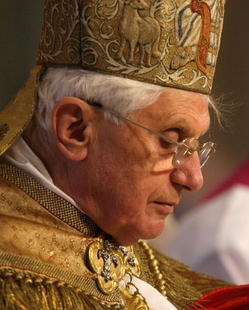 Saint Augustine
Saint Augustine
The general intention
That the Lord may bless farmers’ work with an abundant harvest and sensitize the richer populations to the drama of hunger in the world.
The mission intention
That the Christians who operate in the territories where the conditions of the poor, the weak and the women and children are most tragic, may be signs of hope, thanks to their courageous testimony to the Gospel of solidarity and love.
Pope Benedict: trust in God’s initiative in responding to His call
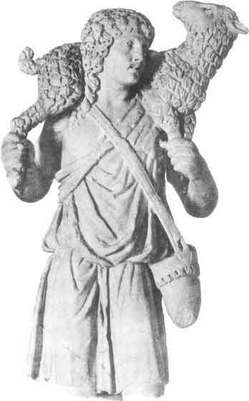 On the occasion of the next World Day of prayer for vocations to the priesthood and to the consecrated life, which will be celebrated on
On the occasion of the next World Day of prayer for vocations to the priesthood and to the consecrated life, which will be celebrated on
The vocation to the priesthood and to the consecrated life constitutes a special gift of God which becomes part of the great plan of love and salvation that God has for every man and woman and for the whole of humanity. The Apostle Paul, whom we remember in a special way during this Pauline Year dedicated to the Two-thousandth anniversary of his birth, writing to the Ephesians says, “Blessed be the God and Father of our Lord Jesus Christ, who has blessed us in Christ with every spiritual blessing in the heavenly places, even as he chose us in him before the foundation of the world, that we should be holy and blameless before him” (Ef 1:3-4). In the universal call to holiness, of particular relevance is God’s initiative of choosing some to follow his Son Jesus Christ more closely, and to be his privileged ministers and witnesses. The divine Master personally called the Apostles “to be with him, and to be sent out to preach and have authority to cast out demons” (Mk
Our first duty, therefore, is to keep alive in families and in parishes, in movements and in apostolic associations, in religious communities and in all the sectors of diocesan life this appeal to the divine initiative with unceasing prayer. We must pray that the whole Christian people grows in its trust in God, convinced that the “Lord of the harvest” does not cease to ask some to place their entire existence freely at his service so as to work with him more closely in the mission of salvation. What is asked of those who are called, for their part, is careful listening and prudent discernment, a generous and willing adherence to the divine plan, and a serious study of the reality that is proper to the priestly and religious vocations, so as to be able to respond responsibly and with conviction.
The Catechism of the Catholic Church rightly reminds us that God’s free initiative requires a free response on the part of men and women; a positive response which always presupposes acceptance of and identification with the plan that God has for everyone; a response which welcomes the Lord’s loving initiative and becomes, for the one who is called, a binding moral imperative, an offering of thanksgiving to God and a total cooperation with the plan which God carries out in history (cf. n. 2062).
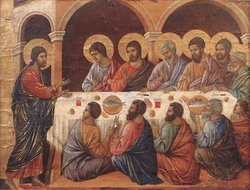 Contemplating the mystery of the Eucharist, which expresses in a sublime way the free gift of the Father in the Person of his Only Begotten Son for the salvation of mankind, and the full and docile readiness of Christ to drink to the dregs the “cup” of the will of God (cf. Mt 26:39), we can more readily understand how “faith in the divine initiative” models and gives value to the “human response“. In the Eucharist, that perfect gift which brings to fulfilment the plan of love for the redemption of the world, Jesus offers himself freely for the salvation of mankind. “The Church”, my beloved predecessor John Paul II wrote, “has received the Eucharist from Christ her Lord not as a gift – however precious – among so many others, but as the gift par excellence, for it is the gift of himself, of his person in his sacred humanity, as well as the gift of his saving work” (Ecclesia de Eucharistia, 11).
Contemplating the mystery of the Eucharist, which expresses in a sublime way the free gift of the Father in the Person of his Only Begotten Son for the salvation of mankind, and the full and docile readiness of Christ to drink to the dregs the “cup” of the will of God (cf. Mt 26:39), we can more readily understand how “faith in the divine initiative” models and gives value to the “human response“. In the Eucharist, that perfect gift which brings to fulfilment the plan of love for the redemption of the world, Jesus offers himself freely for the salvation of mankind. “The Church”, my beloved predecessor John Paul II wrote, “has received the Eucharist from Christ her Lord not as a gift – however precious – among so many others, but as the gift par excellence, for it is the gift of himself, of his person in his sacred humanity, as well as the gift of his saving work” (Ecclesia de Eucharistia, 11).
It is priests who are called to perpetuate this salvific mystery from century to century until the Lord’s glorious return, for they can contemplate, precisely in the Eucharistic Christ, the eminent model of a “vocational dialogue” between the free initiative of the Father and the faithful response of Christ. In the celebration of the Eucharist it is Christ himself who acts in those whom he chooses as his ministers; he supports them so that their response develops in a dimension of trust and gratitude that removes all fear, even when they experience more acutely their own weakness (cf. Rm 8:26-28), or indeed when the experience of misunderstanding or even of persecution is most bitter (cf. Rm 8:35-39).
The awareness of being saved by the love of Christ, which every Mass nourishes in the faithful and especially in priests, cannot but arouse within them a trusting self-abandonment to Christ who gave his life for us. To believe in the Lord and to accept his gift, therefore, leads us to entrust ourselves to Him with thankful hearts, adhering to his plan of salvation. When this does happen, the one who is “called” voluntarily leaves everything and submits himself to the teaching of the divine Master; hence a fruitful dialogue between God and man begins, a mysterious encounter between the love of the Lord who calls and the freedom of man who responds in love, hearing the words of Jesus echoing in his soul, “You did not choose me, but I chose you and appointed you that you should go and bear fruit and that your fruit should abide” (Jn 15:16).
This intertwining of love between the divine initiative and the human response is present also, in a wonderful way, in the vocation to the consecrated life. The Second Vatican Council recalls, “The evangelical counsels of chastity dedicated to God, poverty and obedience are based upon the words and examples of the Lord. They were further commanded by the apostles and Fathers of the Church, as well as by the doctors and pastors of souls. The counsels are a divine gift, which the Church received from its Lord and which it always safeguards with the help of His grace” (Lumen Gentium, 43).
Once more, Jesus is the model of complete and trusting adherence to the will of the Father, to whom every consecrated person must look. Attracted by him, from the very first centuries of Christianity, many men and women have left families, possessions, material riches and all that is humanly desirable in order to follow Christ generously and live the Gospel without compromise, which had become for them a school of deeply rooted holiness. Today too, many undertake this same demanding journey of evangelical perfection and realise their vocation in the profession of the evangelical counsels. The witness of these our brothers and sisters, in contemplative monasteries, religious institutes and congregations of apostolic life, reminds the people of God of “that mystery of the Kingdom of God is already at work in history, even as it awaits its full realization in heaven” (Vita Consecrata, 1).
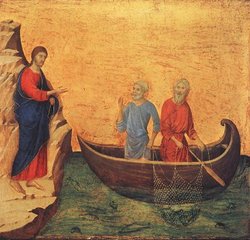 Who can consider himself worthy to approach the priestly ministry? Who can embrace the consecrated life relying only on his or her own human powers? Once again, it is useful to reiterate that the response of men and women to the divine call, whenever they are aware that it is God who takes the initiative and brings His plan of salvation to fulfilment, is never patterned after the timid self-interest of the worthless servant who, out of fear, hid the talent entrusted to him in the ground (cf. Mt 25:14-30), but rather expresses itself in a ready adherence to the Lord’s invitation, as in the case of Peter who, trusting in the Lord’ word, did not hesitate to let down the net once more even after having toiled all night and catching nothing (cf. Lk 5:5). Without in any sense renouncing personal responsibility, the free human response to God thus becomes “co-responsibility”, responsibility in and with Christ, through the action of his Holy Spirit; it becomes communion with the One who makes it possible for us to bear much fruit (cf. Jn 15:5).
Who can consider himself worthy to approach the priestly ministry? Who can embrace the consecrated life relying only on his or her own human powers? Once again, it is useful to reiterate that the response of men and women to the divine call, whenever they are aware that it is God who takes the initiative and brings His plan of salvation to fulfilment, is never patterned after the timid self-interest of the worthless servant who, out of fear, hid the talent entrusted to him in the ground (cf. Mt 25:14-30), but rather expresses itself in a ready adherence to the Lord’s invitation, as in the case of Peter who, trusting in the Lord’ word, did not hesitate to let down the net once more even after having toiled all night and catching nothing (cf. Lk 5:5). Without in any sense renouncing personal responsibility, the free human response to God thus becomes “co-responsibility”, responsibility in and with Christ, through the action of his Holy Spirit; it becomes communion with the One who makes it possible for us to bear much fruit (cf. Jn 15:5).
An emblematic human response, full of trust in God’s initiative, is the generous and unmitigated “Amen” of the Virgin of Nazareth, uttered with humble and decisive adherence to the plan of the Most High announced to her by God’s messenger (cf. Lk 1:38). Her prompt “Yes” allowed Her to become the Mother of God, the Mother of our Saviour. Mary, after this first “fiat”, had to repeat it many times, even up to the culminating moment of the crucifixion of Jesus, when “standing by the cross of Jesus” as the Evangelist John notes, she participated in the dreadful suffering of her innocent Son. And it was from the cross, that Jesus, while dying, gave her to us as Mother and entrusted us to her as sons and daughters (cf. Jn 19:26-27); she is especially the Mother of priests and consecrated persons. I want to entrust to her all those who are aware of God’s call to set out on the road of the ministerial priesthood or consecrated life.
Dear friends, do not become discouraged in the face of difficulties and doubts; trust in God and follow Jesus faithfully and you will be witnesses of the joy that flows from intimate union with him. Imitating the Virgin Mary whom all generations proclaim as blessed because she believed (cf. Lk 1:48), commit yourselves with every spiritual energy, to realise the heavenly Father’s plan of salvation, cultivating in your heart, like her, the ability to be astonished and to adore him who is mighty and does “great things”, for Holy is his name (cf. Lk 1:49).
From the
Benedictus PP. XVI
What the Pope actually said about condoms
The head of the African Jesuit AIDS Network (AJAN) Jesuit Father Michael Czerny reflects on the Pope’s comments on condoms in an online article, “A human and spiritual wake-up call.” The author deals with what the Pope actually said, not what the what media heard. Father Czerny does a good job with the matter.
2 reviews on the Pope in Africa
John Allen reflects on the Pope’s time in Africa (National Catholic Reporter, 2009)
I don’t think I’ve ever covered a papal trip where the gap between internal and external perceptions has been as vast as over these three days. It’s almost as if the pope has made two separate visits to Cameroon: the one reported internationally and the one Africans actually experienced.
In the U.S. and many other parts of the world, coverage has been “all condoms, all the time,” triggered by comments from Benedict aboard the papal plane to the effect that condoms aren’t the right way to fight AIDS. In Africa, meanwhile, the trip has been a hit, beginning with Benedict’s dramatic insistence that Christians must never be silent in the face of “corruption and abuses of power,” and extending through a remarkable meeting with African Muslims in which the pope said more clearly and succinctly what he wanted to say three years ago in his infamous Regensburg address, and without the gratuitous quotation from a Byzantine emperor.
Vast and pumped-up crowds flocked to see the pope, and Benedict seemed swept up in the enthusiasm. Twice he referred to Africa as the “continent of hope,” and at one point, this consummate theologian even mused aloud about a new burst of intellectual energy in Africa that might generate a 21st century version of the famed school of Alexandria, which gave the early church such luminaries as Clement and Origen.
As counter-intuitive as it may seem to Westerners, it was difficult to find anyone in Cameroon –at least anyone who wasn’t a foreign journalist or missionary, or an employee of an overseas NGO– for whom the condoms issue loomed especially large. The locals had different opinions on whether condoms are the right way to tackle AIDS, of course, but it didn’t seem to dominate their impressions of the event.
Bottom line: Seen from abroad, the trip has been about condoms; on the ground, it’s felt like a celebration of African Catholicism. Here’s a surreal experience that underscores the disjunction.
On Tuesday, I prepared a piece on the pope’s indirect, but unmistakable, rebuke of Cameroon’s President Paul Biya – a former Catholic seminarian who has tried repeatedly to wrap himself in the papal flag while Benedict is in town. Billboards around Yaoundè assert a “perfect communion” between the two, and colorful African-style shirts and dresses distributed for the trip are festooned with pictures of Biya and Benedict. Biya is also, however, a classic African strongman, who has ruled Cameroon since 1982 through a blend of occasional repression and constant corruption.
Benedict didn’t want to embarrass his host, but he also didn’t want the photo-op to imply a papal seal of approval. Thus, without mentioning Biya directly, Benedict said pointedly that Christians must speak out against “corruption and abuses of power.” That was enough to set off shockwaves in Cameroon, and it seemed to invigorate local church leaders. The next morning, Cardinal Christian Tumi, Cameroon’s lone cardinal, publicly asked Biya to withdraw as a candidate in elections set for 2011, something that previously almost no one would have dared to do.
I was outlining all this in my article when I had to break off to do an interview with CNN International about day one of the trip … which was entirely devoted to the condoms controversy. To be honest, I had to wonder if we were even talking about the same event.
That said, let me be clear: This perception gap is not exclusively, or even primarily, the media’s fault. The reporter from French TV who asked Benedict the condom question aboard the papal plane was well within bounds; AIDS is serious business, and it’s fair game to ask the pope about it on his first visit to the continent that’s been hardest hit by the disease. Once the question was popped, the ball was in Benedict’s court. Much of the blame for what happened next, therefore, has to lie at his feet.
By that, I’m not taking any position on the substance of the pope’s answer, though in fairness he did no more than repeat church teaching on contraception, as well as the nearly unanimous view of every African bishop I’ve ever interviewed: that condoms give their people a false sense of invulnerability, thereby encouraging risky sexual behavior. That may be debatable, but one can hardly fault the pope for taking his cues from the bishops on the ground. (Ironically, popes usually get in trouble precisely for not listening to local bishops.)
Setting aside what he said, there’s still the matter of whether this was the right time and place to say it – especially since it would inevitably overshadow the message Benedict was flying to Africa to deliver. (It’s worth recalling that the pope has been down this road before. En route to Brazil in 2007, he took a question about excommunicating politicians who support abortion rights, thereby blotting day one of his first trip to Latin America out of the sky.)
Anybody who’s ever spent time in front of cameras knows how to dance around a question that’s not going to lead anywhere good. Benedict could have said something like: “Of course the church is deeply concerned about AIDS, which is why a quarter of all AIDS patients in the world are cared for by Catholic hospitals and other facilities. As far as condoms are concerned, our teaching is well-known, but today isn’t the right time for discussing it. Instead, I want to focus on my message of hope to the African people,” etc., etc. The story that probably would have resulted – “Benedict shrugs off condoms query” – would hardly have generated a global uproar.
Someone hungry for a silver lining might be tempted to say that the sideshow on condoms made the world pay attention to the Africa trip – except, of course, it didn’t. Instead, Africa became a backdrop to another round in the Western culture wars.
Yet however one assigns the blame, the fact remains that international discussion of Benedict in Cameroon has left a badly distorted impression of the trip’s aims and content. If the first rule for assessing an event is to understand what actually happened, then drawing conclusions about Benedict’s African journey is going to require more than simply following the bouncing ball on the great condom debate.
AFRICA/AIDS “wars” distorted by libertarians
John Waters
The Irish Times, 2009
DRIVING AROUND Uganda in recent years, you could hardly help noticing the government-sponsored advertising hoardings along the highway. One had a picture of a smiling man in his 60s with the slogan, “Say No to Sugar Daddies”. Another showed a slightly younger man, and the slogan, “Would you want this man sleeping with your daughter? So why are you sleeping with his?” The billboards were part of Uganda’s long, successful battle against Aids, these posters being directed at creating a sexual firebreak between generations.
In the 1980s, Uganda was at the epicentre of the African Aids catastrophe, but managed to reverse the spread of the disease through an emphasis on cultural adaptation – abstinence, fidelity and some education about condom use. In Europe and America, however, whenever the subject of Aids and Africa is mentioned, there is an assumption that condoms are incontrovertibly the sole option.
No sooner had Pope Benedict XVI stepped off the aircraft in Cameroon this week than the western media was again pumping out its partisan propaganda. The pope was reported saying Aids could not be overcome through the distribution of condoms, “which even aggravates the problems”. As usual, voices asserted that the battle against Aids in Africa was all about condoms, with the Catholic position treated as dangerous obscurantism. Benedict, we were told, was “refusing to yield”.
Spokesmen and women for European governments claimed the use of condoms was the vital element in the fight against Aids. We were told that “even” some priests and nuns working against Aids believe the pope is wrong.
But for every such voice, there are hundreds of priests, nuns and other anti-Aids activists in Africa saying the western obsession with condoms is a distraction. What works is action to change sexual behaviour, and the Catholic Church has long been to the fore in pushing such initiatives.
At the core of the kick-the- pope argument is a gross absurdity. Aids was spread in Africa mainly by truck drivers using prostitutes along the arterial highways that string together an otherwise disorderly continent.
The pope, as well as opposing condoms, is also hostile to prostitution and extra-marital sex, and yet it is implied that those who have been spreading HIV/Aids through promiscuous behaviour would wear condoms if the pope told them to do so. But Pope Benedict is neither a lawmaker nor a policeman. He has the power simply to speak the truth as he has received it and then allow everyone the freedom to decide for themselves.
Whether the libertarian West likes it or not, much of the evidence in Africa indicates that emphasis on monogamy and sexual continence is what delivers on Aids. Uganda many years ago identified the problem as a cultural one relating to sexual promiscuity, with condoms a minor and ambiguous sidebar. The Government promoted the standard “ABC” approach (abstain, be faithful, use condoms), but condoms did not play a significant part in the early battle against the disease, largely because President Yoweri Museveni believed they offered false hope that the disease could be curbed without a change in sexual behaviour. Later, under assault from the West, the Ugandan health ministry began giving out about 80 million free condoms a year. But after some batches were found to be defective, the government now distributes far fewer condoms.
In the 25 years since Aids was first reported in Uganda, broad-based partnerships and effective public education campaigns have contributed to a spectacular decline in the number of people contracting HIV and Aids.
State-sponsored programmes reduced Aids prevalence from over 30 per cent to about 6 per cent. Fidelity to a single partner was the dominant message of early HIV prevention campaigns. Uganda’s first lady Janet Museveni has been a vocal proponent of abstinence approaches, and has been widely criticised by the same people who regularly attack the pope.
In recent years, there has been a slight disimprovement in Uganda’s Aids situation. External critics, predictably, have blamed abstinence policies, but the facts are not so clear-cut. Although western propaganda seeks to fudge this, there is some evidence that condom availability may have diluted the earlier message, causing a shift back to old habits.
Ideally, one might think, abstinence programmes and safe sex strategies should complement each other. But in practice the approaches are mutually incompatible. Once you advocate condom use, you are accepting that abstinence is no longer a persuasive option. And if you argue, as the Catholic Church does, that promiscuity promotes HIV/Aids, it would be ludicrous to recommend measures that, implicitly, suggest that this position can be relativised.
This is a complex issue, which certainly cannot be reduced to a simple questions of condoms. What the world needs is a full and truthful discussion, not bigoted, libertarian propaganda masquerading as reportage.
